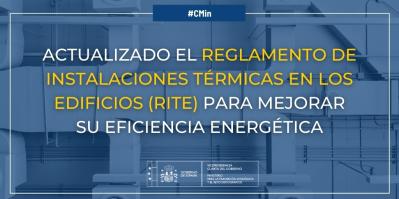

Under the Regulation on Thermal Installations in Buildings (RITE), installing conventional heating systems instead of more sustainable ones will have to be justified
The Government has updated the Regulation on Thermal Installations in Buildings to work towards its energy efficiency target of cutting primary energy consumption by 39.5% by 2030. Under the Regulation on Thermal Installations in Buildings (RITE), installing conventional heating systems instead of more efficient and sustainable ones will have to be justified.
The Council of Ministers has approved the update to the Regulation on Thermal Installations in Buildings (RITE). This update sets the energy efficiency and safety targets for thermal installations in buildings. It is intended to help achieve the climate targets set out in the National Integrated Energy and Climate Plan 2021-2030 (PNIEC). Specifically, the objective of improving energy efficiency by reducing primary energy consumption by 39.5% by 2030 and final energy consumption by 36,809.3 tonnes of oil equivalent (ktoe).
Under this RITE update, installing conventional heating systems in buildings instead of other more efficient and sustainable systems (such as geothermal heat pumps with underfloor heating or hybrid solar-thermal energy with natural gas boiler) will have to justified. This justification must include a side-by-side comparison between the chosen energy production system and other alternatives, covering other technically, environmentally and economically viable systems.
Promoting Renewables
The update also promotes the use of renewable energy in buildings. Whenever a building is renovated, the technical person in charge must propose alternative high-efficiency installations and replacing fossil-fuel equipment with renewables. The energy performance of all technical building installations must also be assessed whenever they are installed, replaced or upgraded.





